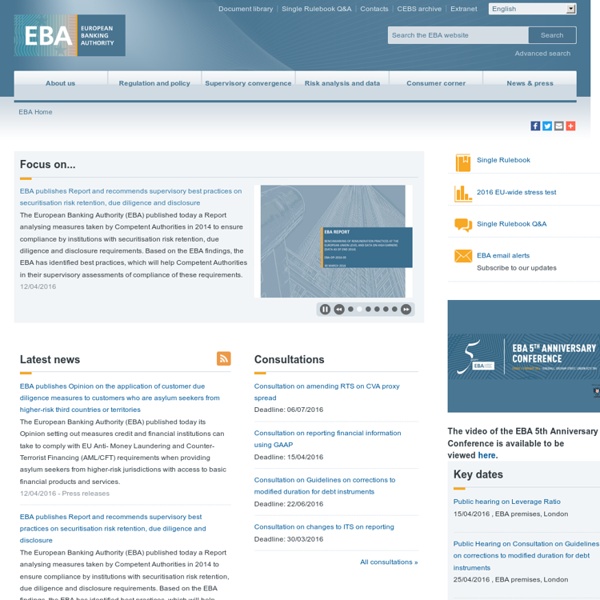



Parlement européen : Affaires économiques et monétaires Le Parlement européen est l'un des grands acteurs de la scène politique européenne et la commission des affaires économiques et monétaires (ECON) est aux avant-postes de l'activité du Parlement. Elle est chargée de dossiers tels que les politiques économique et monétaire de l'Union européenne, la fiscalité et la concurrence, la liberté de circulation des capitaux et la réglementation des services financiers (banques, sociétés d'assurance, fonds de pension, gestion d'actifs/de placements, comptabilité, système monétaire et financier international, etc.). En outre, la plus large part des travaux du Parlement étant conduits dans les commissions, c'est à la commission ECON qu'incombe l'essentiel du travail parlementaire sur ces thèmes économiques et monétaires majeurs. La commission ECON contribue dans une large mesure à l'élaboration de la législation européenne, puisque le Parlement est, avec le Conseil, colégislateur dans la plupart des champs d'action de l'Union européenne.
European Systemic Risk Board Esma | EC Merger regulation Council Regulation (EC) No 139/2004 of 20 January 2004 on the control of concentrations between undertakings (the EC Merger Regulation) (Text with EEA relevance) Having regard to the Treaty establishing the European Community, and in particular Articles 83 and 308 thereof, Having regard to the proposal from the Commission(1), Having regard to the opinion of the European Parliament(2), Having regard to the opinion of the European Economic and Social Committee(3), Whereas: (1) Council Regulation (EEC) No 4064/89 of 21 December 1989 on the control of concentrations between undertakings(4) has been substantially amended. (2) For the achievement of the aims of the Treaty, Article 3(1)(g) gives the Community the objective of instituting a system ensuring that competition in the internal market is not distorted. (8) The provisions to be adopted in this Regulation should apply to significant structural changes, the impact of which on the market goes beyond the national borders of any one Member State.
EIOPA: About EIOPA The European Insurance and Occupational Pensions Authority (EIOPA) was established in consequence of the reforms to the structure of supervision of the financial sector in the European Union. The reform was initiated by the European Commission, following the recommendations of a Committee of Wise Men, chaired by Mr. de Larosière, and supported by the European Council and Parliament. Before and during the financial crisis in 2007 and 2008, the European Parliament has called for a move towards more integrated European supervision in order to ensure a true level playing field for all actors at the level of the European Union and to reflect the increasing integration of financial markets in the Union. As a result, the supervisory framework was strengthened to reduce risk and severity of future financial crises. EIOPA’s main goals are EIOPA is an independent advisory body to the European Parliament, the Council of the European Union and the European Commission.
EFIGE EIOPA: Quantitative Impact Study 5 EIOPA published report on the fifth Quantitative Impact Study for Solvency II on 14 March 2011. To read final report go to Reports To read the letter to the European Commission go to Submissions On 25 March 2011 EIOPA held a stakeholder hearing on QIS5. Click here to view the presentation highlighting the general findings. The European Commission has requested CEIOPS to run the QIS5 exercise between August and November 2010 and publish a report on the results of that exercise in April 2011 in order to provide quantitative input to the finalisation of the Commission's proposal on level 2 implementing measures for the Solvency II Framework Directive. Below, interested parties are provided with all documents and information available and needed for the purpose of the QIS5 exercise.
European Financial Reporting Advisory Group - EFRAG 14/04/2014 | EFRAG INSIDER - First quarter 2014 EFRAG Insider was created in the course of 2010 to inform founding and funding members about current developments in all EFRAG activities. EFRAG Insider is now available to a wider audience and is published every quarter on average. 14/04/2014 | EFRAG's report on the findings from the limited survey on the proposed simplifications to IASB ED Leases EFRAG released a report that summarises the findings from a limited survey on the proposed simplifications to the accounting for lessees under IASB’s Exposure Draft Leases. 11/04/2014 | EFRAG's Draft Comment Letter on the IASB's ED/2014/1 Disclosure Initiative (Amendments to IAS 1) EFRAG published its Draft Comment Letter on the IASB's ED/2014/1 Disclosure Initiative (Amendments to IAS 1). 09/04/2014 | EFRAG’s feedback statement on the IASB’s ED/2013/11 Annual Improvements to IFRSs 2012-2014 Cycle 08/04/2014 | EFRAG Update March / April 2014